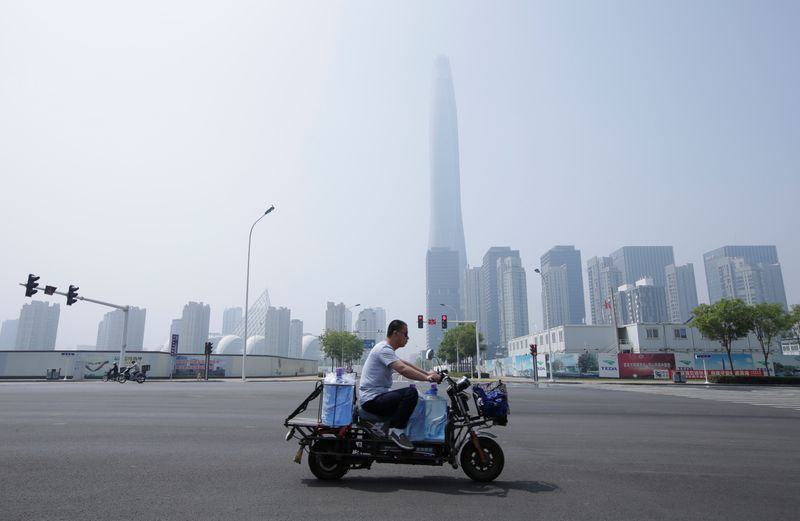By Ellen Zhang and Marius Zaharia
BEIJING/HONG KONG (Reuters) – China’s local governments are lagging behind on their plans to issue government debt as attention grows over potentially wasteful infrastructure spending, fueling talk that such funds could be used elsewhere to help boost growth.
Investments at the municipal level have for years been one of the most efficient instruments to stabilize growth in the world’s second-largest economy. However, the poor performance of recent months calls for a new injection of government stimulus.
But not all of this investment has been productive, as evidenced by the fact that debt has risen faster than growth over the past decade. Huge sums have been spent on railways, roads and bridges, which carry little traffic and are expensive to maintain.
To curb money laundering, authorities are tightening controls on investment projects, especially in China’s 12 most indebted provinces.
As a result, local governments spent only 45.5% of their special debt quota of 3.9 trillion yuan ($546 billion) in the first seven months of this year, compared with 65.7% in the same period of 2023 and 95% in 2022.
The lower-than-expected fiscal stimulus threatens to pull economic growth away from the target of around 5% for this year, threatened by weak household consumption and a severe downturn in the real estate sector.
“It has been difficult to find projects that are profitable in the short term,” said Jack Yuan, senior analyst at Moody’s Ratings. “Many provinces will struggle to meet their growth targets in the absence of larger state-led investments.”
Chinese officials said in March that local special bonds would finance projects with “sufficient preparation” in regions with high investment efficiency.
Yuan and other analysts expect debt issuance to pick up in the coming months as authorities prioritize meeting growth targets promised at key political meetings in July.
But that may require Beijing to approve new ways for cities and provinces to spend the money, which is normally used for transportation, water, energy, urban landscapes and other infrastructure.
Analysts say new areas could include buying empty apartments for social housing or buying back vacant residential land. Such moves would pump money into the crisis-hit real estate sector, giving developers a lifeline to resume or accelerate construction of backlogged residential projects and improve homebuyer confidence.
“The government needs to broaden the scope of these bonds,” said Larry Hu, chief China economist at Macquarie, who sees real estate as a potential new destination for such funds.
“We will see that issuance will accelerate, fiscal support for the economy will increase and then we may be able to meet the growth target after all.”
The Chinese newspaper Economic Observer reported in June that the Ministry of Natural Resources had proposed that local governments use special bonds to buy back vacant land.
Another possibility is that municipal bonds could be used to convert higher-yielding debt issued by local government financing vehicles into higher-yielding debt, easing financing pressures and limiting the spillover effects on the real economy from deleveraging, Moody’s Yuan said.
WASTE
Infrastructure investment rose 4.9% year-on-year in January-July, lower than the 6.8% increase in the same period of 2023.
Local authorities are spending less on urban landscaping, according to a government source in Lanzhou, the capital of the debt-ridden province of Gansu.
While special bonds can be spent on expanding green areas, in many cases this meant replanting a perfect lawn in a park or planting flowers and greenery along the road, rather than creating new green spaces, the source said.
This generates temporary jobs. But it does not improve living standards in the long term, nor does it provide a return, while the government is committed to debt repayment. Such spending did not take place this year, the source said.
“That was a waste,” said the source, who asked not to be named because they were not authorized to speak to the media. “The principle was to spend the money or it would be taken away.”
A source at the Beijing municipal government said: “It used to be easier to apply for funds. When someone applied for a project, they asked for as much as possible.”
Now “we have to figure out why the project needs to be done. They say every project is a cost center.”
A policy adviser, who also spoke on condition of anonymity because of the sensitivity of the issue, said relying on government investment to stimulate growth has led to debt and corruption. Local officials need to find projects that generate enough revenue to repay the interest on the debt, the adviser said.
“But such projects don’t exist every year,” the adviser said, explaining the slow debt issuance. “It’s better to give the money to low-income groups to stimulate consumption.”
(Image by Kripa Jayaram; Editing by Shri Navaratnam)

